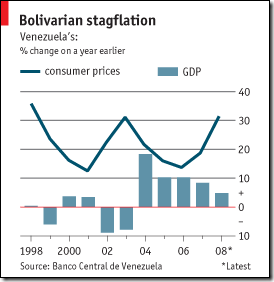The Economist, 19/06/2008
Hugo Chávez invites the private sector to help him build socialism
TO BUILD his promised socialist revolution, Hugo Chávez seems to have concluded that he needs the help of capitalist businessmen. Earlier this month he invited a handpicked group of captains of finance and industry to the presidential palace. He lectured them about the imminent demise of capitalism, but then proceeded to offer them cheap credit and joint ventures to “reactivate” production.
 That such efforts are needed is at first sight odd. Although it sells at a discount because much of it is heavy and sulphurous, the price of a barrel of Venezuelan oil recently topped $120. This year, Mr Chávez says, oil will contribute $75 billion to government revenues, up from $43.5 billion last year and only around $7 billion when he came to power in 1999.
That such efforts are needed is at first sight odd. Although it sells at a discount because much of it is heavy and sulphurous, the price of a barrel of Venezuelan oil recently topped $120. This year, Mr Chávez says, oil will contribute $75 billion to government revenues, up from $43.5 billion last year and only around $7 billion when he came to power in 1999.
Nevertheless, the economy slowed sharply in the first quarter of this year (see chart). That came as a surprise to the planning ministry, which had forecast growth of 6.7%. To make matters worse, the government's inflation forecast of 12% for this year has proved even more wildly optimistic. This is particularly bad news for the poor, Mr Chávez's main constituency. The price of food is rising faster than the overall index. According to the Centre for Documentation and Analysis (CENDA), a group linked to the trade unions, the cost of feeding a family of five rose by 2.4% in May and stands some 60% higher than the minimum wage, even though this was recently increased. For the first time in the past three years, the living standards of ordinary Venezuelans are declining.
After losing a referendum on constitutional change last December—Mr Chávez's first electoral defeat—the government has made efforts to tackle the sources of popular discontent, including food shortages. It has used its oil wealth to import more food. But as fast as one gap is plugged another appears. CENDA reports that staples such as black beans, rice, maize flour and meat were missing from the shelves of many shops in May. Butchers have staged protests, complaining that price controls oblige them to sell some cuts below cost. The government's consumer watchdog accuses them of hoarding and speculation, complaining that they are selling under the counter to restaurants at a higher price.
Officials rightly point out that the shortages arise partly because Venezuelans are consuming more. But they also reflect big economic imbalances. The government has channelled much of its oil wealth into handouts and subsidies, while its socialist policies have provided little incentive to increase production. Private investment has all but dried up. Businessmen have been scared by Mr Chávez's recent nationalisations of the cement and iron and steel industries, and some dairy companies. Most industries are producing “at the limit” of their capacity, admits Andrés Izarra, the information minister.
The president has tacitly recognised the problem. As the inflation rate climbed above 3% a month late last year, he silently applied the brakes: the government raised interest rates and slowed the rate of increase in public spending. It also managed to narrow the gap between the official exchange rate and the price of the dollar in the free market. It did so partly by stepping up the sale of bonds, which can be legally traded for dollars, but it helped that political tension subsided somewhat after the referendum.
The government's new-found appetite for austerity has strict limits. In November Mr Chávez faces regional elections which many Venezuelans will see as an unofficial referendum on his rule. He has made it clear that he will not cut social spending. There is little sign that the private sector will respond to Mr Chávez's appeals to help to build socialism. All this suggests that the battle against inflation will be hard. To wage it, the president this week named as his finance minister Alí Rodríguez, a veteran official who has close ties to Cuba, Venezuela's closest ally. Perhaps he has noticed that Cuba's communist government has recently concluded that private farming, rather than socialism, is the best way to feed the people.
No hay comentarios.:
Publicar un comentario